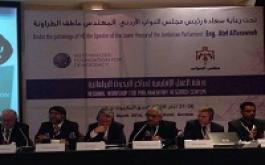
The Pakistan Institute for Parliamentary Services (PIPS) was recognized as a centre of excellence at the REGIONAL WORKSHOP OF PARLIAMENTARY RESEARCH CENTRES in the able guidance of Honourable Speaker, Parliament of Jordan, Eng. Alef Al Taraweh, held between March 30-31, 2016 at Amman, Jordan with the support of Westminster Foundation for Democracy, WFD, UK.
Panel Sessions: Thirty five (35) delegates comprising leadership (MPs/Director Generals/Heads/Directors) of 14 Parliamentary Research Centres from 13 countries: Jordan, Morocco, Tunisia, UK, Ireland, Iraq, Bahrain, Palestine, Mozambique, Ghana, Sri Lanka, Pakistan and Indonesia participated in absorbing interactive deliberations on thematic areas: i. How MPs use parliamentary research, ii. What makes good parliamentary research, iii. working group on decentralization, iv. Communication tools, v. challenges of parliamentary research centres as well as vi. Delivering quality work to users and relationships with committees.
Key Note Panelists included H. E. Atef Taraweh, Speaker of Jordanian House for Democracy, Rob Clement former Director UK House of Commons, John Power, Director Ireland Assembly Research Centre, Dr Dina Melhem, Regional Director, Westminster Foundation for Democracy (WFD) UK, Muhammad Rashid Mafzool Zaka, Acting Executive Director/ Director Research and Information Technology, Pakistan Institute for Parliamentary Services, Hon. Dr Abdellatif Berrocho, Member Parliament, Moroccan House of Representatives, Oliver Bennett, UK and Dr Emad Daoud, Director, Dar al Khubra, Iraq.
Presentation of Memento: On behalf of President PIPS Board of Governors and Honourable Speaker National Assembly of Pakistan, Sardar Ayaz Sadiq, the PIPS’ Acting Executive Director presented momento of Parliament of Pakistan to H E Honourable Speaker, Parliament of Jordan, Eng. Alef Al Taraweh, on March 30 and a sovnioer to Ms Dina Melhem, Regional Director, WFD UK on March 31, 2016.
PIPS Session: Mr Muhammad Rashid Mafzool Zaka spoke on Best Practices of Parliamentary Research on March 30, that underlined the need of principles of parliamentary research including non-partisanship, timeliness, anticipation of legislative needs to prepare products for committees, accessibility to Members of Parliament, confidentiality, simple and easy to understand presentation of papers and last but not the least quality assurance. On day two a paper prepared by PIPS on electoral reforms was also presented and appreciated by all participants as a comprehensive and model effort.
PIPS support to Sri Lankan Parliament: In April 2016, Sri Lankan Parliament sought PIPS guidance to set up their model Parliamentary Research Centre, whereby Institute’s Research wing is providing essential technical support.
Way Forward – Regional Network of Parliamentary Research Centres established: At the concluding session of two day deliberations, following joint communique was adopted on March 31, 2016, by leadership of 12 parliamentary research centres of 12 countries of Middle East, North Africa and South Asia to develop future networking among the participating parliamentary research centres:
Joint Communiqué
We, the Members of faculty of the regional parliamentary research centres, met at the REGIONAL WORKSHOP OF PARLIAMENTARY RESEARCH CENTRES in the able guidance of Honourable Speaker, Parliament of Jordan, Eng. Alef Al Taraweh, held between March 30-31, 2016 at Amman, Jordan with the support of Westminster Foundation for Democracy, WFD, UK. The workshop provided us an opportunity for evidence based knowledge sharing, presenting status of progress made by parliamentary centres being developed in our countries and targets that take account of the existing mechanisms, share best practices of research and analysis, prioritize issues and challenges in setting up and consolidating quality-oriented parliamentary research centres to assist Members of Parliament in making informed decisions viz a viz their arduous tasks of legislation, oversight, representation and policy analysis. Furthermore, the workshop strengthened our knowledge to develop mechanisms to interact with the think-tanks, researchers, academia, policy institutions, media, development partners and key stakeholders.
Towards the conclusion of this two day Conference, we the participants of Regional Workshop of Parliamentary Centres, acknowledge the hard work of WFD and Parliament of Jordan in holding such an absorbing conference. We reiterate our commitment to continue our cooperation in following areas to share knowledge and best practices to enable us in offering quality-oriented parliamentary research support to Members of Parliament as well as parliamentary committees:
We Reaffirm our desire to work together, strengthen and broaden our roles as parliamentary research centres, and to institutionalize and to build upon the existing alliances among us and key stakeholders at all levels and ensure inclusiveness, and effective quality-oriented assistance to our Parliaments.